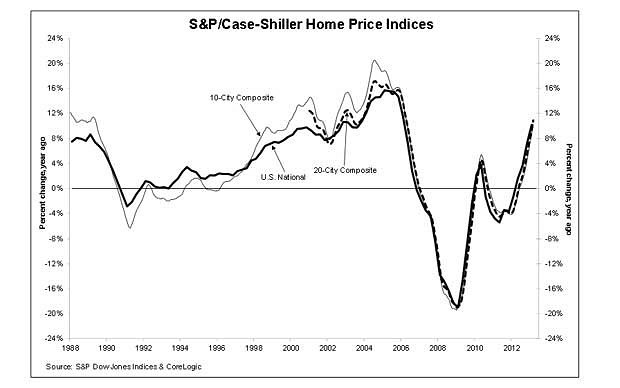US stocks rise as data show home prices confidence climbed
Post on: 12 Апрель, 2015 No Comment

U.S. stocks rose, with the Dow Jones Industrial Average returning to a record, after data showed consumer confidence climbed to the highest level since 2008 and home values jumped the most in seven years.
Eight out of 10 S&P 500 groups advanced. State Street added 4.1 percent, pacing gains among financial shares, as Moody’s Investors Service lifted its outlook for the U.S. banking system. Merck added 1 percent after Jefferies & Co. increased the stock to a buy. Tiffany increased 4 percent after reporting first-quarter earnings that beat analysts’ estimates.
The Standard & Poor’s 500 Index rallied 0.6 percent to 1,660.06 in New York. The benchmark equity gauge pared gains after earlier rising as much as 1.5 percent. The Dow added 106.29 points, or 0.7 percent, to 15,409.39 on Tuesday. About 6.32 billion shares traded hands on U.S. exchanges Tuesday, in line with the three-month average.
The bottom line is there’s been a lot of chatter about how the market’s going to respond when the Fed tapers, but home prices are rising, jobless claims are coming down, and the stock market keeps going up, James Paulsen, the Minneapolis-based chief investment strategist at Wells Capital Management, which oversees $325 billion, said by telephone. People are feeling better. They’re noticing this recovery broadening out and firing on more cylinders on a regular basis. They know they’re under-allocated to risk assets.
The S&P 500 rebounded from its first weekly decline since April 19. The gauge fell 1.1 percent last week as Federal Reserve Chairman Ben Bernanke said the central bank could reduce monetary stimulus if economic conditions continue to improve. Investors weighed the prospect of slower Fed bond-buying with data showing that existing home sales climbed and jobless claims topped estimates. U.S. markets were closed Monday for a holiday.
The benchmark equity index has advanced 3.9 percent so far in May, for a seventh month of gains. That’s the longest winning streak since September 2009. The gauge has surged 145 percent since March 2009, driven by better-than-estimated corporate earnings and three rounds of bond purchases from the Fed.
The Dow has rallied for 20 straight Tuesdays, the longest streak since at least 1900, according to data by Schaeffer’s Investment Research. The winning streak is the second-longest for any day of the week, following the Dow’s gain for 24 straight Wednesdays in 1968, data by Schaeffer’s Senior Technical Analyst Ryan Detrick show.
Investors still clearly believe that we have the Bernanke put well in place on the marketplace, Michael Mullaney, chief investment officer at Fiduciary Trust in Boston, said by phone Tuesday. His firm manages about $9.5 billion. That’s what driving everything right now. From a fundamental standpoint, from a macroeconomic standpoint, you can’t justify these levels right now. The marketplace is ahead of itself from what we can tell.
U.S. stocks extended gains earlier in the session after a Conference Board report showed consumer confidence climbed in May to the highest level in more than five years. The index rose to 76.2, the strongest since February 2008 and exceeding the highest estimate in a Bloomberg survey of economists.
Separate data showed that house prices rose in the 12 months through March by the most in seven years as the recovery in residential real estate gained momentum. The S&P/Case-Shiller index of property values increased 10.9 percent from March 2012, the biggest 12-month gain since April 2006, after advancing 9.4 percent in February.
The Chicago Board Options Exchange Volatility Index, or VIX, rose 3.5 percent to 14.48. The equity volatility gauge, which moves in the opposite direction as the S&P 500 about 80 percent of the time, is down 20 percent for the year after jumping 12 percent last week.
Financial stocks gained 1 percent as a group, after earlier rising as much as 1.9 percent. American Express added 1.2 percent to $76.16 and JPMorgan Chase rallied 1.8 percent to $54.60.
The KBW Bank Index jumped 1.3 percent to the highest level since November 2008, as 22 out of 24 U.S. lenders in the measure advanced. State Street rose 4.1 percent to $67.15.
Moody’s changed its outlook for the U.S. banking system to stable after keeping it negative since 2008, saying that the country’s economy poses less of a threat. Gross domestic product will grow between 1.5 percent and 2.5 percent through next year, helping banks avoid losses, the New York-based credit-rating company said Tuesday in a statement.
Energy shares added 1 percent. Exxon Mobil, the world’s largest oil company by market value, climbed 0.9 percent to $92.38.

Health-care stocks rose 0.9 percent. Merck added 1 percent to $47.62. The second-biggest U.S. drugmaker was raised to buy from hold by Jefferies analyst Jeffrey Holford, who also increased his price target to $54 a share from $48, saying mounting shareholder pressure may lead to a restructuring.
Tiffany added 4 percent to $79.22. The world’s second- largest luxury jewelry retailer reported first-quarter earnings excluding some items of 70 cents a share, surpassing the 53 cent-average estimate of analysts in a Bloomberg survey.
Tesla Motors rose 14 percent, the most in the Russell 1000 Index, to $110.33. The electric-car maker led by Elon Musk is preparing to announce an expansion of its charger network for its vehicles this week. Musk said May 20 the announcement of the expansion of its so-called supercharger network was being pushed back to this week after the Palo Alto, Calif.-based company repaid a U.S. loan.
Valeant Pharmaceuticals surged 8.7 percent to a record $91.80 after agreeing to buy Bausch & Lomb for $8.7 billion. Canada’s largest drugmaker’s acquisition of Bausch & Lomb, the eye-care company owned by Warburg Pincus, positions Valeant to compete globally in the growing, specialized ophthalmology market.
Utility companies lost 1.2 percent as a group, after a surge of proposed new plants in the nation’s largest wholesale power market caused forward prices to drop. Exelon tumbled 7.5 percent to $32.04. The Chicago-based company, which is the largest U.S. operator of nuclear reactors, was cut to hold from buy at Deutsche Bank.
FirstEnergy erased 6.5 percent to $39.86 for its biggest decline in four years. The Akron, Ohio-based utility company was cut to neutral from outperform at Credit Suisse. The power companies, which stood to gain from coal plant retirements, are facing more competition from planned natural gas-fueled facilities and imports from neighboring markets.
By Inyoung Hwang
(c) 2013, Bloomberg News.














